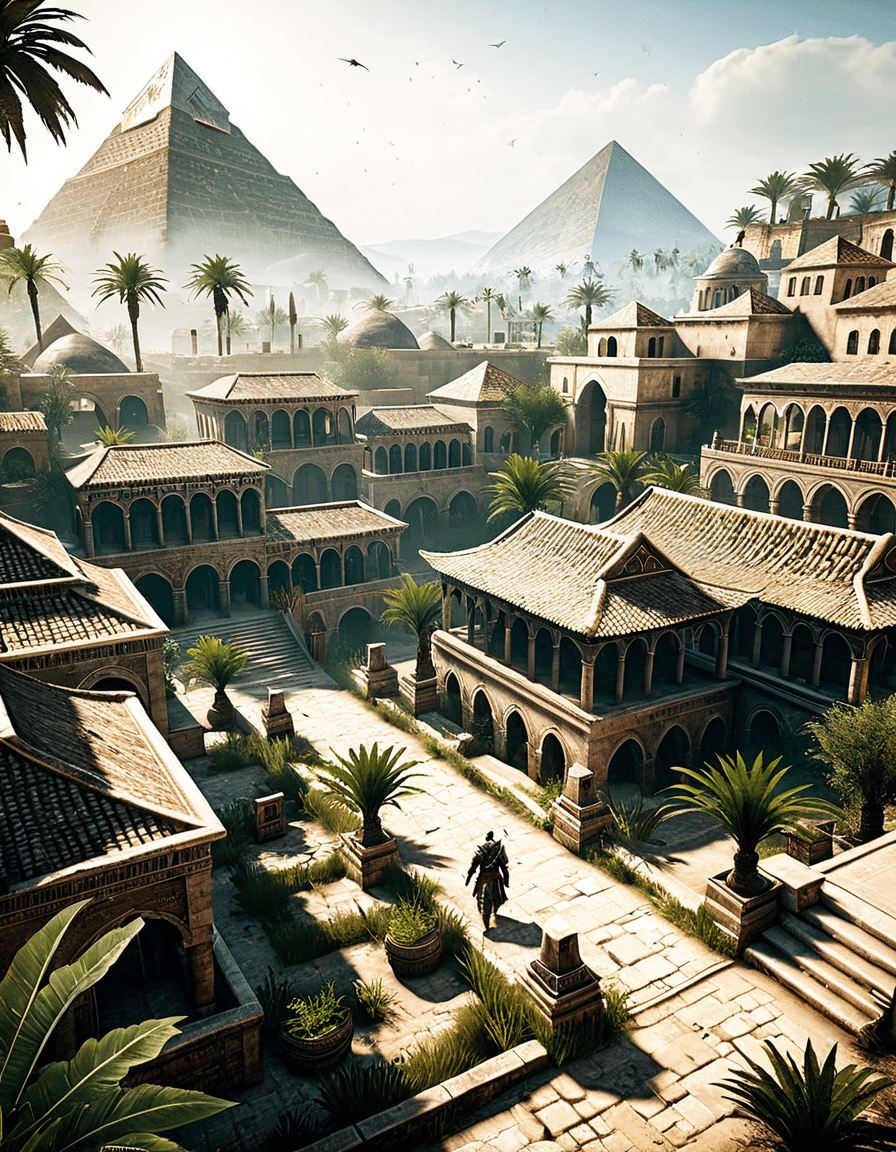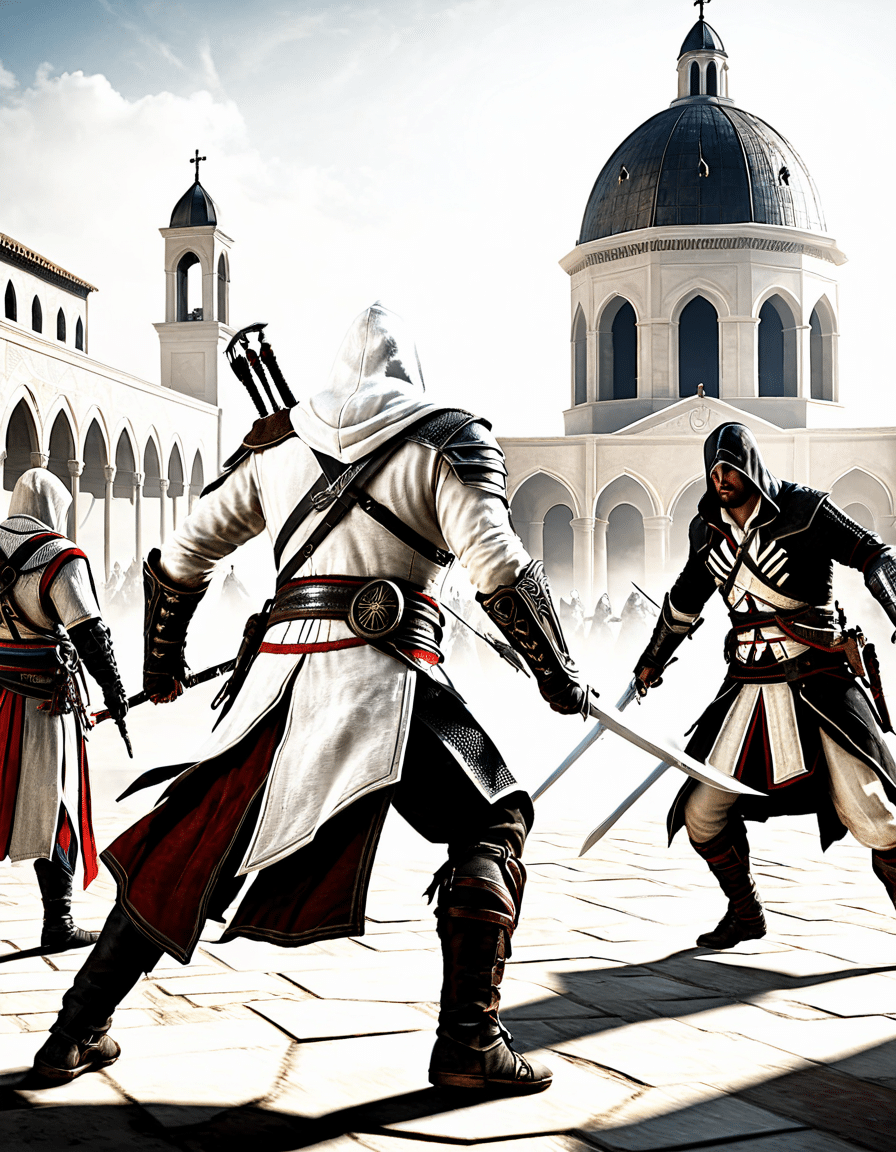
Assassins Creed Games In Order For Epic Adventures
The Assassins Creed games in order take players on a breathtaking adventure through history, seamlessly merging action-packed gameplay with rich narratives. Since its inception in 2007, this series has not only captured the imagination of gamers globally but has also set a benchmark in the world of interactive storytelling. By exploring the timeline of these games chronologically, fans can deepen their understanding of the overarching narrative and the evolution of gaming mechanics.

1. Assassins Creed (2007)
The Assassins Creed journey kicks off during the Third Crusade, putting players in the shoes of Altair Ibn-La’Ahad. This initial entry introduced innovative gameplay mechanics like parkour and stealth, allowing players to traverse the landscape of the Holy Land. Beyond technical achievements, Altair’s quest established the series’ enduring themes of freedom versus control, planting seeds for narratives that would blossom in later installments.
As the story unfolds, players encounter key historical figures, adding authenticity and depth to the experience. The rich environments invite exploration, making playing the first game feel like stepping into a beautifully rendered history book. Consequently, Altair’s struggles with loyalty and morality would resonate throughout the franchise, setting a precedent for complex character arcs.

2. Assassins Creed II (2009)
Assassins Creed II ramps up the narrative complexity by introducing Ezio Auditore da Firenze, right amidst the Italian Renaissance. This installment elevates character development to new heights, as players witness Ezio’s transformation from a young man driven by vengeance into a wise mentor striving for peace. The game is also famous for its beautiful Renaissance artwork, enveloping players in an era rich with cultural and political upheaval.
The expanded mission structures enhance gameplay, allowing for varied strategies in tackling objectives. Players can choose stealth, combat, or a mix of the two, which greatly enriches replayability. The success of Ezio’s story laid the groundwork for numerous sequels, with his character becoming a fan favorite, thereby connecting players deeply to the ongoing narrative of the assassins creed games in order.
3. Assassins Creed Brotherhood (2010)
Continuing from Assassins Creed II, Assassins Creed Brotherhood focuses on Ezio’s battle to liberate Rome from Borgia control. This sequel introduced a multiplayer component, allowing gamers to compete as Assassins and Templars in a series of tactical challenges. The notion of a brotherhood becomes more significant here, as players recruit NPC Assassins to join in their cause, illustrating the power dynamics at play.
The game deepens existing themes of freedom and control, illustrating societal structures through the lens of a power struggle. Additionally, the game’s mechanics saw improvements, allowing for more immersive combat and stealth engagements. Brotherhood didn’t just build on its predecessor—it crafted a narrative that felt inherently connected to the struggles facing Ezio and his followers.
4. Assassins Creed Revelations (2011)
In Assassins Creed Revelations, the narrative reaches a climax as players switch between Ezio and Altair, showcasing the interconnectedness of their journeys. Set in Constantinople, this installment delves into themes of legacy and knowledge, reflecting the timeless search for understanding. The game’s setting evokes a sense of mystery and exploration as players navigate through both the plot and the rich Turkish landscapes.
Revelations also integrates the game mechanics polished from previous entries, providing a seamless experience that encourages players to explore diverse environments. These elements cement the series’ stance on knowledge as power, carving a unique niche within the broader gaming landscape. Notably, this installment continues to show how the assassins creed games in order tie into real historical narratives, shedding light on past ideologies and conflicts.
5. Assassins Creed III (2012)
With Assassins Creed III, players enter the dramatic world of the American Revolution through the eyes of Connor Kenway. This transition marks a significant shift in protagonist and geography, offering a fresh perspective on colonial struggles. The game’s story parallels contemporary discussions about governance, freedom, and national identity, rooting it firmly in relevance.
Naval combat introduces an enthralling mechanic, allowing players to sail ships and engage in battles at sea. This not only diversifies gameplay but also immerses players in the naval history of the era. Connor’s personal struggles reflect broader social conflicts, capturing the essence of this tumultuous period in American history and aligning with the series’ continuity.
6. Assassins Creed IV: Black Flag (2013)
Taking the franchise further into the high seas, Assassins Creed IV: Black Flag embraces the pirate era, bringing forth an expansive open-world experience. Players sail the Caribbean as Edward Kenway, embarking on a swashbuckling adventure filled with treasure hunting and conflict on both land and sea. The shift to a focus on exploration allows players to engage consistently with the vibrant environment, breathing new life into the assassins creed games in order.
This installment is lauded for its innovative design and storytelling that capitalizes on the allure of piracy. Engaging gameplay mechanics complement the thrilling narrative, ensuring that every player feels like part of a grand seafaring epic. With its unique approach, Black Flag revitalized the series while weaving in historical events and legends that keep gamers captivated.
7. Assassins Creed Origins (2017)
With Assassins Creed Origins, the series undergoes a significant reboot, transporting players to Ancient Egypt. This game narrates the origin of the Assassin Brotherhood, charting the complex relationships during the reign of Cleopatra. The introduction of RPG elements and a more immersive open world elevates storytelling, enhancing the players’ connection to the narrative.
The gameplay mechanics shift from linear to a more explorative style, encouraging players to discover stories and secrets at their own pace. This transformation reflects a broader trend in gaming, blending traditional narratives with player choice. With its electrifying mix of historical intrigue and personal discovery, Origins revitalized interest in the franchise, while expanding the narrative layers of the assassins creed games in order.
8. Assassins Creed Odyssey (2018)
Taking a step further in player agency, Assassins Creed Odyssey allows players to choose between two characters, either Alexios or Kassandra, during the Peloponnesian War. This installment is particularly notable for its focus on player-driven choices, enabling gamers to shape their own narratives based on decisions made throughout the game. This level of interactivity sets it apart, echoing the trends seen in franchises like the Percy Jackson series in order, where the characters evolve based on player engagement.
Additionally, the game cleverly intertwines historical events with mythological undertones, providing an experience that appeals to both lovers of history and fantasy. The depth of storytelling is complemented by beautiful graphics that render ancient Greece in vivid detail. By further pushing the boundaries of the series, Odyssey signifies a notable evolution in the assassins creed games in order, effectively engaging players on multiple emotional and intellectual levels.
9. Assassins Creed Valhalla (2020)
Finally, Assassins Creed Valhalla dives into the extraordinary world of Viking culture. Here, players step into the rugged world of Eivor, exploring themes of community, conflict, and survival as they conquer lands in England. Richly woven narratives coupled with Norse mythology provide layers of depth that enhance the overall experience, expanding the franchise’s narrative horizons.
The game incorporates complex player choices that impact relationships and alliances, adding strategic layers to the gameplay. This mechanic creates a feeling of agency and ownership in the storytelling process. Valhalla stands as a testament to the franchise’s ability to adapt and innovate while remaining true to its roots, solidifying its place in the chronological framework of the assassins creed games in order.
A Comprehensive Journey: Assassins Creed and Beyond
As we trace the assassins creed games in order, it becomes clear that each installment builds upon its predecessors while concurrently crafting a larger narrative. The series engages players with philosophical and moral dilemmas, blending history with fiction. This is not unlike the Batman games in order, which explore themes of heroism and morality, or the Percy Jackson series in order, infusing the modern world with ancient myths.
Each game is a unique chapter that tells a story while sparking dialogue around power, freedom, and what it means to be human. As players dive into each high-stakes adventure, they confront not only the historical contexts but also the very real implications for the modern world—an endeavor that transcends mere entertainment.
The Evolution and Future of Interactive Storytelling
Looking ahead to 2026, the landscape of gaming is poised for further growth. The Assassins Creed franchise stands at the forefront, constantly redefining interactive storytelling. We can imagine a future where augmented reality and artificial intelligence allow players to engage with historical narratives like never before, turning the gaming experience into a living, breathing encounter with the past.
The series has evolved into much more than a collection of games; it reflects societal narratives and ongoing themes of conflict and resolution. The complexity of its storytelling mirrors the human experience, challenging players to examine their values while enjoying epic adventures. As we await the next chapter in this storied lineage, one question looms large: what new historical epochs will we explore next?
In the rich tapestry of gaming, the Assassins Creed games in order capture the essence of storytelling across different timelines, inviting players to engage in a dialogue about freedom, control, and the legacy of the ages. With each game, the franchise has not only entertained but also educated, ensuring its spot at the center of this evolving narrative landscape.
Feel free to check out more about pivotal moments in film and entertainment at Loaded.
Assassins Creed Games In Order For Epic Adventures
Diving Into the Timeline
Ah, the Assassin’s Creed franchise! It’s a treasure trove for gamers who love a good story mixed with historical settings. The series launched in 2007 with the original game, setting the stage for centuries of conflicts between Assassins and Templars. Did you know the game’s inspiration includes real-world architecture, like the iconic Pan Am Building? This behemoth in New York City gives players a glimpse into the stunning skyscrapers and rich landscapes they’ll explore throughout the saga. The Assassin’s Creed games in order allow players to travel through time and feel the weight of history on their virtual shoulders.
Noteworthy Tidbits
Each game brings its unique flair and characters. For instance, the stealth mechanics borrowed from films like Chronicles Of Riddick give players a dynamic approach to their missions. And speaking of adventures, did you catch the reference to Numero Uno? The game’s emphasis on being the best ninja-style man on the block parallels the atmosphere of friendly competition in many gaming experiences. As players dive deeper into the lore, they’ll discover connections that resonate with pop culture, including references to fighters like Big Baby davis from the boxing world.
Layered Narratives
The Assassin’s Creed series is layered with narratives that echo beyond gaming. As characters clash with historical figures, the series explores themes of power, control, and freedom, much like the eccentricities of South Park mexican‘s musical stances or the daring kicks found in Black Belt films. Each installment serves to challenge player morals and decisions, making the experiences far richer than typical gameplay. And here’s a fun fact: the modern-day protagonist’s struggles often parallel real-world events where even sports legends like Vinny Testaverde become unlikely symbols of perseverance. It’s these connections that elevate the franchise to an artistic level, blending history with personal journeys.
Final Thoughts
As you sift through the Assassin’s Creed games in order, you’ll appreciate how much work goes into crafting a tale that resonates. Whether it’s through engaging storylines, rich historical contexts, or the surprising nostalgia of figures like Holly Thomas or even the celebrity antics surrounding a Paris Hilton baby, the franchise continuously evolves to captivate its audience. Each game is much more than just a play; it opens a door to epic adventures that linger long after the console’s turned off. So, gear up, grab your hidden blade, and embark on an unforgettable journey through time!










